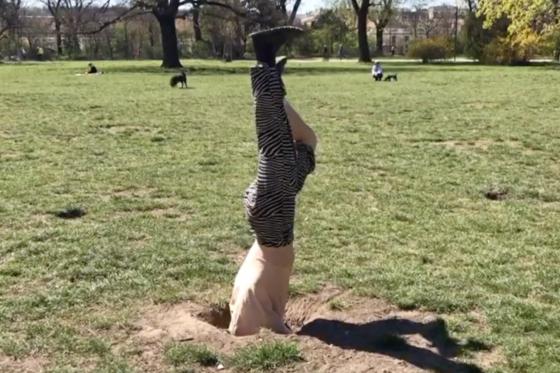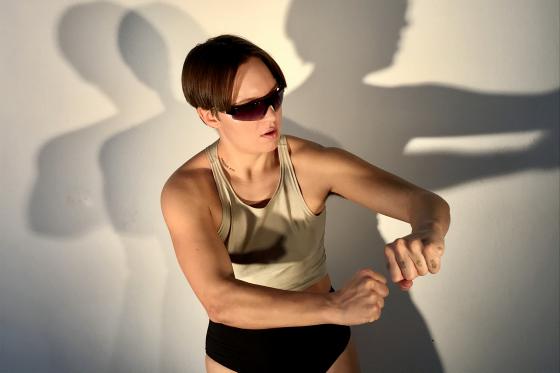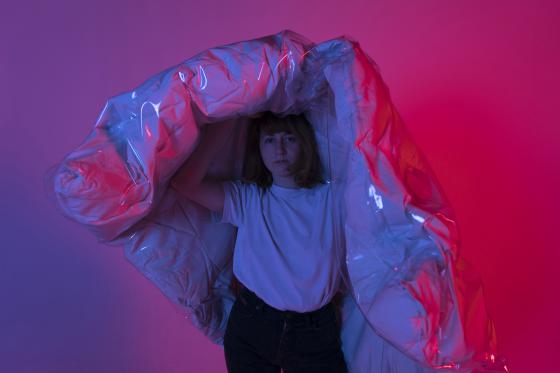Claudia Lomoschitz & Lau Lukkarila – CAKES & CRISIS
Neither of us, Claudia and Lau, have ever been particularly keen on baking activities. Faced with a worldwide COVID-19 lockdown in March 2020, we were delighted to have an already intertwined bacteria-pool due to our friendship and imagetanz projects, thus we didn’t have to isolate ourselves from each other. Having all work cancelled for the upcoming months, we were forced to rethink our artistic practices. One afternoon we found ourselves pulled into a synergy of creation: baking a cake in crisis. From buying the ingredients to composing the cake until finishing the video editing, the crisis-cake was a collaborative attempt. But what does baking mean in times of crisis?
In a capitalist society many people seem to consider baking merely as a remedy for the stresses of the ‘real work’. On health blogs we read that ‘anxiety baking’ can be used as a form of meditation (alongside breathing) and as a mode of ‘self-care’. If we would tell this to our grandmothers and mothers, would they feel offended? Baking might be meditative in times of free-flowing collective anxiety and compulsory productivity, but baking doesn’t cease to be part of domestic labour such as daily cooking, cleaning, doing the laundry and taking care of children. Domestic labour is a feminised duty and unpaid, at least when taking place inside a nuclear family. Baking a cake is also a form of care work, a work dedicated to spreading joy.
On that note, perhaps a state administered quarantine is a conspiracy to gain gender equality? Under quarantine many men need to spend time at home as much as women. Are men cleaning, cooking, looking after their children, spreading joy? In some cases definitely yes, but in many homes patriarchal toxins come to the fore in isolation and aggression as well as domestic violence increases. Baking, as other domestic work is still embedded in a network of unequal power distribution and power abuse. When in the kitchen, perhaps one can acquire a room of one’s own?
By the end of summer 2020 the Austrian government has normalised constant surveillance, people are micromanaging each other in public space, children have stopped playing together and corporations have taken over small-businesses. Under these conditions it seems decadent to talk about cakes. ‘Qu'ils mangent de la brioche’ or ‘Sollen Sie Kuchen essen’ or ‘Let them eat cake’ (as Marie Antoinette never said). As if cake would be something only the bourgeoisie could afford to think of! Succeeding in baking a cake gives a sense of control over one’s life, a crucial sensation when the government inaugurates a police state. Baking may serve the lucky ones as a distraction from the future, but to eat a cake also feels like a small protest against the total economisation of our bodies.
CARROT CAKE in times of crisis
2 cups flour anxiety
2 teaspoons baking soda riot
1 teaspoon salt ecology
1 1/2 teaspoons cinnamon forest
1 1/4 cups vegetable oil desire
1 cup granulated sugar self-determination
1 cup cane sugar capitalism
1 teaspoon vanilla extract care
4 large eggs fear of future
3 cups peeled carrots (5 to 6 medium carrots) no income
1 cup chopped (pecan) nuts not-knowing
Preheat the oven to 176C. Grease and flour the bottom and sides of your baking form. Whisk flour, baking soda, salt, cinnamon until well blended. In a separate bowl, whisk the oil, sugars, vanilla and whisk in eggs, one at a time. Then add the dry ingredients. Then stir in the carrots and nuts. Bake the mass in the baking form for 35 to 45 minutes. When a toothpick is inserted to the center of the cake and it comes out clean, it’s done. Cool cake for at least 15 min before frosting.
FROSTING
225 grams cream cheese online activities
1 1/4 cups powdered sugar contacting long lost people
1/3 cup whipping cream crying
1/2 cup dried flowers laughter
In a large bowl, beat cream cheese until creamy, beat in the powdered sugar, a 1/4 cup at a time. Pour in cream and beat on medium speed. Chill covered until ready to frost cake. When the cake is cool, frost the top of it and pour flowers on it.
CLAUDIA LOMOSCHITZ
is an artist and choreographer working in the intersecting field of performance and fine arts. She holds a MA degree in performance studies from the university of Hamburg and studied at the Academy of Fine Arts Vienna where she currently works as lecturer. Her performance Vulcano Compendium was shown at Kunstraum Niederösterreich (2019), The Pixel of your Touch was shown at Lichthof Theater (2019) and her work Induced Lactation premiered at Kampnagel (2017). Her solo Soft Skills regards the relationality of political radicalism and intimacy and will be shown at brut 2020. She collaborates with the artist collective One Mess Gallery and Die Fitten Titten. In 2019 she received the APAP-performing Europe scholarship (2019) and the danceWEB scholarship from ImPulsTanz (2018).
www.claudialomoschitz.com
LAU LUKKARILA
Lau is a choreographer and performer born in Oulu, Finland. They studied theatre and contemporary dance in Finland and Spain between 2008-2013. Since 2016 they are based in Vienna. Among others they have worked with Marta Navaridas (ES/AT), Michael Turinsky (AT), Veza Fernández (ES/AT), Keith Hennessy (US) & Peaches (US/DE), Berivan Sayici (AT), Franziska Kabisch (DE/AT), Magdalena Fischer (AT), Alison Kopit (US), Be Hope Heintzman (CA), Kaaos Company (FI), Hanna Brotherus (FI) and Reality Research Centre (FI). 2018 Lau received the Austrian Federal Chancellor’s Office’s START Scholarship for Music and Performing Arts as well as the danceWEB Scholarship at ImPulsTanz Festival. They were also granted a Tanzquartier Training Scholarship and they published an Internet EP Super Like. 2019 Lau performed the solo work Trouble at Rakete Festival / Tanzquartier Wien and in 2020 the solo NYXXX at imagetanz / brut Wien.
In our online magazine in the New Art on ... line section, artists have the opportunity to let their creativity run free in videos, texts and more, away from the usual stage events.
Events

Veza Fernández – Neverwiederagain
Lau Lukkarila
Nyxxx
Online Video und Artist Talk
brut all over Vienna
brut nordwest
barrierefrei
Nordwestbahnstraße 8-10, 1200 Wien
U-Bahn: U1, U2 (Praterstern), U4 (Friedensbrücke), U6 (Dresdnerstraße) Tram: 5 (Nordwestbahnstraße) Bus: 5A (Wasnergasse)
barrierefrei
studio brut
nicht barrierefrei
Zieglergasse 25, 1070 Wien
U-Bahn: U3 (Zieglergasse), Tram: 49 (Westbahnstraße / Zieglergasse)
nicht barrierefrei









